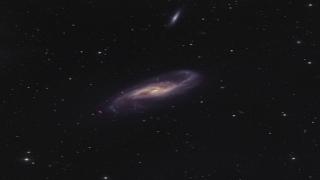Bibcode
Muñoz-Mateos, J. C.; Sheth, Kartik; Regan, Michael; Kim, Taehyun; Laine, Jarkko; Erroz-Ferrer, S.; Gil de Paz, Armando; Comeron, Sebastien; Hinz, Joannah; Laurikainen, Eija; Salo, Heikki; Athanassoula, E.; Bosma, Albert; Bouquin, Alexandre Y. K.; Schinnerer, Eva; Ho, Luis; Zaritsky, Dennis; Gadotti, Dimitri A.; Madore, Barry; Holwerda, Benne; Menéndez-Delmestre, Karín; Knapen, J. H.; Meidt, Sharon; Querejeta, Miguel; Mizusawa, Trisha; Seibert, Mark; Laine, Seppo; Courtois, Helene
Referencia bibliográfica
The Astrophysical Journal Supplement Series, Volume 219, Issue 1, article id. 3, 22 pp. (2015).
Fecha de publicación:
7
2015
Número de citas
150
Número de citas referidas
136
Descripción
The Spitzer Survey of Stellar Structure in Galaxies is a volume,
magnitude, and size-limited survey of 2352 nearby galaxies with deep
imaging at 3.6 and 4.5 μm. In this paper, we describe our surface
photometry pipeline and showcase the associated data products that we
have released to the community. We also identify the physical mechanisms
leading to different levels of central stellar mass concentration for
galaxies with the same total stellar mass. Finally, we derive the local
stellar mass–size relation at 3.6 μm for galaxies of different
morphologies. Our radial profiles reach stellar mass surface densities
below ∼ 1 {M}ȯ {{pc}}-2. Given the
negligible impact of dust and the almost constant mass-to-light ratio at
these wavelengths, these profiles constitute an accurate inventory of
the radial distribution of stellar mass in nearby galaxies. From these
profiles we have also derived global properties such as asymptotic
magnitudes (and the corresponding stellar masses), isophotal sizes and
shapes, and concentration indices. These and other data products from
our various pipelines (science-ready mosaics, object masks, 2D image
decompositions, and stellar mass maps) can be publicly accessed at IRSA
(http://irsa.ipac.caltech.edu/data/SPITZER/S4G/).
Proyectos relacionados

Las Galaxias Espirales: Evolución y Consecuencias
Nuestro grupo pequeño esta bien conocido y respetado internacionalmente por nuestro trabajo inovativo e importante en varios aspectos de la estructura y la evolución de las galaxias espirales cercanas. Usamos principalmente observaciones en varias longitudes de onda, explotando las sinergías que nos permiten responder a las cuestiones más
Johan Hendrik
Knapen Koelstra